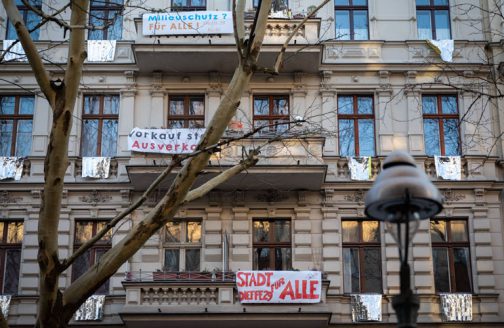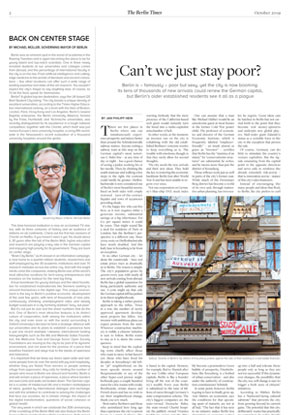Can’t we just stay poor?

Berlin is – famously – poor but sexy, yet the city is now booming. Its tens of thousands of new arrivals could renew the German capital, but Berlin’s older established residents see it all as a plague.
There are few places in Berlin where one can simultaneously experience prosperity and misery better than around the Schönleinstrasse subway station. Anyone exiting a subway train at this stop on the German capital’s most notorious U-Bahn line – at any time of day or night – has a good chance of seeing a junkie working his or her needle. Then, by climbing the south staircase and walking a few steps to the right, the contrast could hardly be greater. Dieffenbachstrasse is now considered one of Berlin’s most beautiful streets, lined on both sides with crisply restored turn-of-the-century facades and rows of sycamores providing shade.
It’s the happy few who can live here, as it now requires either a generous income, substantial savings or a big inheritance. For €12 per square meter, it could be yours. That might sound like a steal for residents of Paris or London, but the Berliner’s perspective is a different one. Since 2009, rents on Dieffenbachstrase have nearly doubled. And this leafy lane in Kreuzberg is far from an exception.
In no other German city – let alone the countryside – have real estate prices risen as drastically as in Berlin. The reason is simple: The city’s population grows by 40,000 every year, with nearly all new arrivals coming from abroad. Berlin has a global reputation for being particularly authentic and raw. A cynic might say that only the German capital still has junkies in its finest neighborhoods.
Berlin is taking a rather passive approach to the influx. Twice in a row, the number of newly approved apartment development projects has fallen. Any investor with ambitious plans can expect protests from the start. Wherever construction machinery is visible, a citizens’ initiative is sure to follow. Berlin wants to stay as it is, damn the consequences.
Keep in mind that the exploding rents chiefly affect those who want to move in but haven’t yet; those who have lived for decades in Kreuzberg’s old leftist “36” neighborhood, on the more upscale streets around Bergmannstrasse or any of the other hyper-cool prewar neighborhoods pays a couple hundred euros for a few rooms with creaky floorboards, ornate stucco and French doors and has no wish to see their neighborhood change, thank you very much.
Most native Berliners and those who assimilated here long ago thus experience the city’s current boom as a kind of plague. The surrounding misery, meanwhile, is for them a kind of romanticized urban backdrop that should just be left the way it is, free of private sector interference and – worst of all – modern apartment buildings.
This attitude is not subversive. In Berlin, it is canonized as official policy. Some months ago, Kreuzberg’s commissioner for construction, Florian Schmidt, publicly celebrated having successfully fended off the establishment of a Google campus in his district. Schmidt, a Green Party member, knows well the reactionary instincts of his constituents. A citizens’ initiative had been warning tirelessly that the mere presence of the California-based tech giant would instantly turn the hood into a turbo-capitalist antechamber of hell. In other words, at the moment, an investor run on the city is cohabiting with the old established Berliners’ concrete resolve to keep everything as is. The trouble with emotions, though, is that they rarely allow for second thoughts.
The city needs the new arrivals and their new ideas. They hold the key to restoring the economic backbone Berlin lost after World War II and has been unable to regrow ever since.
Not one corporation on Germany’s blue-chip DAX stock index is based in the capital. Siemens, for example, fled to Munich after the war. Unlike other European capitals, Berlin is like a boarder living off the rest of the country’s wealth. Every year, Berlin is subsidized to the tune of billions of euros through Germany’s state compensation scheme. The city’s biggest companies are the state-owned Deutsche Bahn, the state-owned Charite hospital, the publicly owned Vivantes healthcare group and the BVG transit authority, which indeed also belongs to Berlin.
Of course, unleashed construction and private sector growth would not directly help the junkies in the subway. But the city’s disastrous school system and its snail-paced administrative structure – one that can hardly keep up with its duties, including the issuance of construction permits – are the result of Berlin’s economic weakness, which in turn has much to do with the mentality of its people. The city could do much more to care for its neediest if it were not a welfare case itself.
One can assume that a man like Michael Hüther would be an unwelcome guest at most homes in the former Cold War poster child. The professor of economics and director of the German Economic Institute, which is frequently labeled “employer-friendly” – an insult almost as grave as “investor” – certifies that Berlin has the “stamina of an island.” Its “conservationist structures” are substantial, he writes, and he means more than just the district of Kreuzberg.
Those reflexes work just as well in parts of the city’s former east. While much of the Prenzlauer Berg district has become a world of its own and, through inattentive urban planning, has irrevocably become a postmodern Green bubble of prosperity, Friedrichshain, like Kreuzberg, is a hotbed of urban conservation – and also under the authority of construction commissioner Schmidt.
At some point, however, Berlin is going to have to finally grow up. And Hüther, an economist, says the conditions for that upcoming spurt of maturity are not at all bad. “The fact that it has next to no industry makes Berlin less dependent on economic cycles,” he writes. That a city that happens to be the nation’s capital also sports a big administrative sector is hardly surprising. Berlin dynamic culture, including oodles of restaurants and hotels, Hüther says. But especially important and an essential part of the current boom is the startup sector. And this, he stressed, is where problems need to be solved. These problems extend beyond the capital; they affect the entire country, Hüther says. Entrepreneurs receive support only at the outset. Subsequent rounds of financing for startups are a taboo in the land of Benz and Daimler, he regrets. Good ideas can be hatched in Berlin but not carried forth to the point that they become real money-spinners and underpin new global players. Mail-order giant Zalando’s status as a veritable force in the city is the exception that proves the rule.
Of course, Germany can do little to stimulate the country’s venture capitalists. But the signals emanating from the capital point in the opposite direction and serve only to reinforce the already extremely risk-averse – that is, innovation-averse – stance of this city’s idea financiers.
Instead of encouraging the many people and ideas that flock to Berlin, the city prefers to curl up into a ball and tolerate these people only as long as they are not too successful. If this dynamic ever changes, the possibility that the city, too, will change is sure to trigger a fresh wave of citizens’ initiatives.
According to Hüther, Berlin has a “backward-facing cultural substrate” that prevents the city from growing beyond its current guise. The potential that this city deliberately wastes has practically no comparison, he writes. People here even seem proud of this fact.
One day, the boom will end. When several generations of successful entrepreneurs experience Berlin as a city with forcibly imposed restrictions, they will say so. And when that happens, the residents of Kreuzberg will again find themselves completely undisturbed in their habitat, with a bit of misery as decoration – after all, it’s authentic, right?
Jan-Philipp Hein
is a Berlin-based freelance journalist and founder of the writers’ platform Salonkolumnisten.




